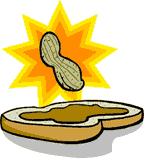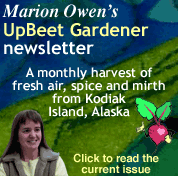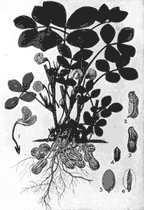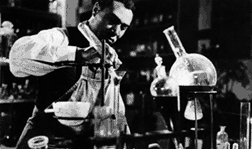
For the Love of Peanuts
How George Washington Carver embraced life
Essay by Marion
Owen, Fearless Weeder for PlanTea, Inc. and
Co-author of Chicken Soup for the Gardener's Soul
FEATURE ARTICLE:

Tom Hanks' "Power of Four" solution
More good stuff:
Who is Marion Owen?
FAQs about PlanTea
Search Marion's articles, tips and recipes
Why grow organic?
News and press releases
Read love letters
How to link to this site
Need a speaker?
How to contact Marion
Visiting Alaska?
Come to Kodiak Island!
Go to home page

Marion's UpBeet Gardener
Newsletter has been
replaced by Marion's blog
which you can find at:
www.marionowen.wordpress.com

I believe in the power of intention, thought and things unseen. After all, everything in life starts with an idea, a thought, from candles and computers to bagels and blue jeans. In fact, next time you open a jar of peanut butter or lick a postage stamp, you can thank George Washington Carver. Peanuts and postage stamps?

Ideas become a reality when we put our energy into them, especially emotional and inspired energy. But where do ideas come from? Some people meditate to be open to ideas, while others receive inspirations while listening to music. Albert Einstein took naps to clear his head, saying it made him more creative. George Washington Carver went for daily strolls before daybreak.
Isn't it true that if a glass is full, you can't put any more water in it? Or, to put it another way, what if our minds are already full say, of the daily chatter? Then there's no room for anything else. The most earth-moving, awe-inspiring idea doesn't have a chance at entering our jam-packed brains--and sticking--if we're preoccupied with what to have for dinner, or the next appointment.
How
George Washington Carver made the best
of daydreams and daily walks
A scientist and quiet man who witnessed the devastation left by the Civil War, Carver devoted his life to improving conditions in the South. Using his talents as a botanist and chemist, Carver turned the unknown sweet potato and the lowly peanut, used only as hog food, into hundreds of products from cosmetics and axle grease to printer's ink and coffee.
His talents and his methods though, stunned even his fellow scientists because plants seemed to reveal their hidden secrets to him. Once, when invited to Washington, DC, Carver amazed government officials with dozens of products he'd developed including a starch that proved valuable to the textile industry and later became a component in the glue for postage stamps. Not bad for a man who was born a slave.
The boy was later kidnapped and raised by his former owner, Moses Carver. At that point, lemons looked more like lemonade for young Carver, and he took advantage of his newfound freedom.
The young plant doctor
 From
the time he was able to get around in the Missouri countryside, Carver
showed an uncanny knowledge of all growing things. Local farmers remembered
the scrawny kid roaming for hours through their fields, looking for certain
plants and bringing back varieties with which he could miraculously heal
sick animals.
From
the time he was able to get around in the Missouri countryside, Carver
showed an uncanny knowledge of all growing things. Local farmers remembered
the scrawny kid roaming for hours through their fields, looking for certain
plants and bringing back varieties with which he could miraculously heal
sick animals.
On his own, the child planted a private garden on a remote plot of land. Later he built a secret greenhouse in the woods with scrap materials. Before long, farmers' wives from all over the region began bringing him their sick house plants, begging him to make them flourish and bloom. Gently caring for them in his own way, Carver often sang to them in his squeaky voice, planted them with special soil mixtures and took them outside "to play in the sun."
Time passed and Carver enrolled in Simpson College in Indianola, Iowa. He supported himself as a laundryman, doing shirts for students. After transferring to the Iowa State College of Agriculture, he met his best-loved teacher, Henry Cantwell Wallace. Though carrying a heavy course load, Carver found time to go for walks in the woods with Wallace's young grandson, who eventually became the Secretary of Agriculture, and later, Vice President of the United States.
|
"It
is through science that we prove, |
Carver returned to the South. In a few weeks he realized that the main problem facing his farmer-neighbors was that the land was slowly being depleted through monoculture, the planting of a single crop, cotton. A heavy feeder, cotton had been draining the fertility out of the soil for generations.
Soil robbers
Carver, in his visionary way, linked caring of the soil to sharing kindness to one another. "Unkindness to anything means an injustice done to the thing," he said. "If I am unkind to you I do you an injustice, or wrong you in some way. On the other hand, if I try to assist you in every way that I can to make a better citizen and in every way to do my very best for you, I am kind to you.
"The above principles apply with equal force to the soil. The farmer whose soil produces less every year, is unkind to it in some way; that is, he is not doing by it what he should; he is robbing it of some substance it must have, and he becomes, therefore, a soil robber rather than a progressive farmer."

The renowned botanist and "doctor of plants," George Washington Carver is best known for his research of the peanut, discovering over 200 different products. But the first farmers he convinced to plant peanuts instead of cotton soon came to him in distress. "We did as you said Dr. Carver, but there are no markets for our new crops and the peanuts are rotting in our fields."
Carver was devastated by their plight. Troubled and unable to sleep, he got up early one morning and went for a walk in the woods. "I cried out to the Creator," said Carver. "I asked, 'Mr. Creator, why did you make the peanut?'"

George Washington Carver
in his lab
As Carver put it, "'The Lord said, and He gave me a handful of peanuts and went with me back to the laboratory and, together, we got down to work."
With an extensive knowledge of chemistry and physics, Carver set to work in his lab. Like reducing a car down to bolts and hub caps, he separated the peanut into its basic components of water, fats, oils, gums, resins, sugars, starches, and amino acids. Then he tried every combination he could think of, subjecting them to different conditions of temperature, pressure, and so on.
All his life, Carver recognized the value of quiet time. Before attending to his lectures or laboratory work, he rose every morning at four o'clock to walk in the woods. He'd bring back numerous plants with which to illustrate his lectures. When asked about his early morning habits, Carver explained, "Nature is the greatest teacher and I learn from her best when others are asleep.
"To me, Nature . . . is the little window through which God permits me to commune with Him, and to see much of His glory, by simply lifting the curtain and looking in. I love to think of Nature as wireless telegraph stations through which God speaks to us every day, every hour, and every moment of our lives."
Imagine, God is constantly sending us tips, inspirations, guidance and ideas.
Is your glass full; your line busy?
Thanks for visiting and please stop by again. I'll put the coffee on!
Meet Marion Owen /// Learn about PlanTea /// Online Catalog /// Articles, Tips, Recipes /// Get free UpBeet Gardener newsletter /// Read current issue /// Listen to radio show /// Read news and press releases /// More resources and links /// Learn why 'grow organic?' /// View guidelines for retailers /// Read love letters /// Book Marion as a speaker /// Site map /// How to link to us /// Contact us /// Go to home page
PlanTea: The organic plant food in tea bags. http://www.plantea.com
Copyright ©1996 to present: PlanTea, Inc. All Rights Reserved. PO Box 1980, Kodiak, AK 99615-1980 USA
Questions or comments? marion@plantea.com Phone: Toll Free: 1-800-253-6331 (US and Canada); 907-486-2500